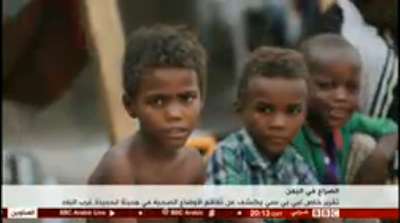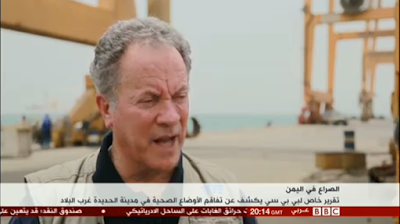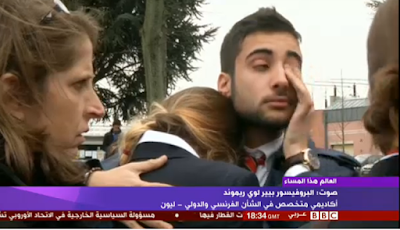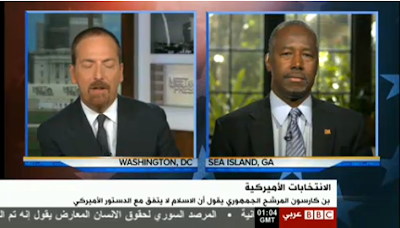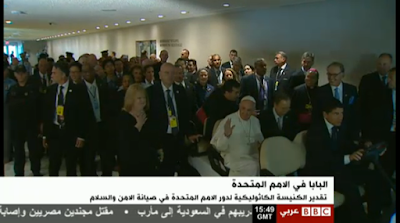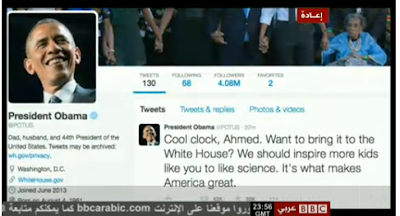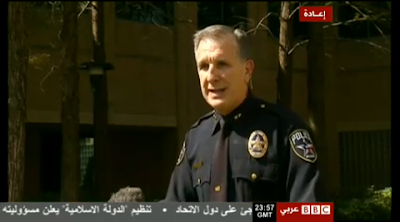The BBC Arabic did program about female contenders for Oscar honors later this month. They focused on female contenders in light of the #MeToo movement. So I think they started talking about Harry Weinstein, but then they quickly switched to interviews with the director and cast of "Ladybird", and then with Meryl Streep. Can you believe all those big names are doing interviews with the Arabic news?!
They started off with Greta Gerwig, who directed "Ladybird". Have you seen it? I have not. But I like what the director said. She was talking about how much or how little the film is based on her own life. It's about a teenaged girl in high school. But lots of people like the film. Greta Gerwig said: "The more specific you make a story, the more universal it is."
Then they talked to Saoirse Ronan, the actress playing the teenage girl. Saoirse has had a profound impact on my life, for reasons too addle-brained to explain. So watched her pop up on the BBC Arabic was quite something!
Then finally, here's the BBC Arabic man interviewing Meryl Streep about her movie, "The Post". They also started talking about #MeToo. She said: Maybe what women want is not empowerment; just inclusion. 50-50% at the top levels, at the board rooms, etc. It makes the world wacky when it's out of balance. If women aren't at the leadership level, then you can't blame men for thinking women are something less.
Showing posts with label United States. Show all posts
Showing posts with label United States. Show all posts
Saturday, February 17, 2018
Tuesday, September 5, 2017
Hurricane Harvey
The BBC Arabic spent a lot of time on Hurricane Harvey. They sent their correspondent Luqman Ahmed to Houston. They showed the flooding, mused as to whether this disaster would increase concern over global warming, and showed people gathering in shelters and organizing all the supplies.
While Luqman was out and about giving his report, a group of teenaged boys went walking far back in the scene. They got pretty engrossed when they saw the camera, and one of them kept coming back and waving his hand. I'm willing to bet that kid has no idea he ended up on the Arabic news.
While Luqman was out and about giving his report, a group of teenaged boys went walking far back in the scene. They got pretty engrossed when they saw the camera, and one of them kept coming back and waving his hand. I'm willing to bet that kid has no idea he ended up on the Arabic news.
Dying children in Yemen
The BBC Arabic visited a hospital in Yemen full of dying children.
The hospital has very little equipment, as there's been a lot of bombing in Yemen over the last few years. This doctor, for example, is explaining that conditions are much worse than just a year ago - and they weren't good a year ago to start with.
Here is one of the dying children:
He is three years old, and I think he was starving to death. The hospital doesn't have anything that can help. His own family tries to take care of hm.
And this is all happening at the last functioning hospital in this particular city. It's called Hudaida, and it's on Yemen's coast. The streets of this city are filled with displaced people.
The streaming got blurry, unfortunately, but in the back of this scene you can just see a kid about 10 years old bouncing a baby on his knee:
This city is important for Yemen, because it is the main port where ships come in, bringing food and medicine. But there is nothing coming in now, because Saudi Arabia has laid siege to it. Saudi Arabia is also the country - with the help of weapons from the United States and the UK - bombing Yemen.
Here is the stock-still port:
And a worker from the World Food Programme explaining about the siege, and how so many are hungry:
In the meantime, cholera has also broken out. This boy, Yahya, is 13, and is struck down with cholera, I think they said along with 18 of his family members.
They were still at the hospital when the three-year-old child died. Here, his father is carrying the body away. They said they wanted the cameras there to show the world what was happening.
The hospital has very little equipment, as there's been a lot of bombing in Yemen over the last few years. This doctor, for example, is explaining that conditions are much worse than just a year ago - and they weren't good a year ago to start with.
Here is one of the dying children:
He is three years old, and I think he was starving to death. The hospital doesn't have anything that can help. His own family tries to take care of hm.
And this is all happening at the last functioning hospital in this particular city. It's called Hudaida, and it's on Yemen's coast. The streets of this city are filled with displaced people.
The streaming got blurry, unfortunately, but in the back of this scene you can just see a kid about 10 years old bouncing a baby on his knee:
This city is important for Yemen, because it is the main port where ships come in, bringing food and medicine. But there is nothing coming in now, because Saudi Arabia has laid siege to it. Saudi Arabia is also the country - with the help of weapons from the United States and the UK - bombing Yemen.
Here is the stock-still port:
And a worker from the World Food Programme explaining about the siege, and how so many are hungry:
In the meantime, cholera has also broken out. This boy, Yahya, is 13, and is struck down with cholera, I think they said along with 18 of his family members.
They were still at the hospital when the three-year-old child died. Here, his father is carrying the body away. They said they wanted the cameras there to show the world what was happening.
Eclipse
The BBC Arabic carried the August 21 eclipse live. They had lots of coverage of it, and sent their USA-based correspondent to Nashville to witness it.
The name of the correspondent is Luqman Ahmed. I really like him, because I've seen him now for so many years, and his voice and face and demeanor are comfortable and familiar. Here he is above at the height of totality.
And here below, cheesing really hard:
25 million Americans have traveled to witness the eclipse, he kept exclaiming. There's eclipses in other parts of the world, too, but the Americans are the most excited.
Look at that sky. And the glasses come back out.
The name of the correspondent is Luqman Ahmed. I really like him, because I've seen him now for so many years, and his voice and face and demeanor are comfortable and familiar. Here he is above at the height of totality.
And here below, cheesing really hard:
25 million Americans have traveled to witness the eclipse, he kept exclaiming. There's eclipses in other parts of the world, too, but the Americans are the most excited.
Look at that sky. And the glasses come back out.
Friday, August 11, 2017
Oregon shooting from way back when
This news is from way back when - October 2015. Obama was still president, and there had been a shooting in Oregon. I think it was at a community college.
The BBC Arabic spent a lot of time talking about gun violence in the US. I think sometimes they like doing that, it gives them some relief from always reporting on misery in the Arab world.
It was Malak Jaafar leading the conversation.
She started by saying: 1 million 400 people have died in gun violence, and that's more than all the wars, combined. (Did I record that correctly?).
Then she continued: after the shooting of 20 six and seven year olds in Connecticut, 5 million people signed up for the National Rifle Association. "That is strange!" muses Malak.
They showed a photo of Obama after the Connecticut shooting:
Then they showed him now: Obama is really mad, Malak put in.
Obama said (and the BBC Arabic translated): we have become numb. We should be shocked by all this.
They talked about how there are 300 million guns in the USA. Malak started stumbling over her words. "This ... is ... a ... a ... a scary number."
Malak pointed out that in Oregon, you can just walk into a store and buy a gun, and does this ease of access play a role? Or would people otherwise just get the guns on the black market. Not sure what the guest said about that.
The guest said: $3 trillion has been spent on wars because 3,000 Americans died; so why's nothing done about the great wave of gun violence?
"You know, in the US, it's the automatic weapons that you can get a hold of. And in fact, the US has more murders than Mexico, which is known for its guns."
Is that true?
The BBC Arabic spent a lot of time talking about gun violence in the US. I think sometimes they like doing that, it gives them some relief from always reporting on misery in the Arab world.
It was Malak Jaafar leading the conversation.
She started by saying: 1 million 400 people have died in gun violence, and that's more than all the wars, combined. (Did I record that correctly?).
Then she continued: after the shooting of 20 six and seven year olds in Connecticut, 5 million people signed up for the National Rifle Association. "That is strange!" muses Malak.
They showed a photo of Obama after the Connecticut shooting:
Then they showed him now: Obama is really mad, Malak put in.
Obama said (and the BBC Arabic translated): we have become numb. We should be shocked by all this.
They talked about how there are 300 million guns in the USA. Malak started stumbling over her words. "This ... is ... a ... a ... a scary number."
Malak pointed out that in Oregon, you can just walk into a store and buy a gun, and does this ease of access play a role? Or would people otherwise just get the guns on the black market. Not sure what the guest said about that.
The guest said: $3 trillion has been spent on wars because 3,000 Americans died; so why's nothing done about the great wave of gun violence?
"You know, in the US, it's the automatic weapons that you can get a hold of. And in fact, the US has more murders than Mexico, which is known for its guns."
Is that true?
Security Debate after Belgium Attack
This is BBC Arabic coverage from way back when - the bombing of the airport in Brussels (March, 2016).
They showed images of stunned passengers at the airport ...
They showed people evacuating the city by foot - if I remember, the metro and public transport systems were shut down.
The empty and echoing Brussels metro system:
Then, they had all the analysts come out. Rasha Qandeel was the BBC anchorwoman steering the conversation.
Some of the analysts said: Belgium was surprised by the attack, so it was a big security failure. And they must not have done enough security preparations.
Rasha said: ok, but we complain when governments do take harsh measures. Can we really blame Belgium for not doing what some extreme right-wing governments have proposed doing?
Security expert: no, no, but --- and then the internet cut off!
This American expert said: It's hard to monitor everyone. The San Bernardino murderers were not on the radar of the government. The government can monitor email and Facebook, but sometimes people aren't announcing their plans there.
Then he added (this was before the 2016 American elections) this will probably help Trump's standing in the polls. People will think he's the only one who can stop all the attacks.
But then he seemed to say, maybe it won't make that much of a difference. He said, "at the end of the day, it's just talk" (not really sure what he was referring to). "You know, neither Democrats nor Republicans want terror in the United States. No one wants a terror attack on their watch, they get blamed for it."
Resha: "But Trump says he's going to ban Muslims, he's playing on hate."
American security expert: "He didn't just talk about Muslims, he talked about Latinos, too. And now the US has a population that is 45% minorities, it's very hard to hate on all of them."
Again, this conversation is from March 2016.
They showed a lot of mourners and tributes to the dead and wounded:
They showed images of stunned passengers at the airport ...
They showed people evacuating the city by foot - if I remember, the metro and public transport systems were shut down.
The empty and echoing Brussels metro system:
Then, they had all the analysts come out. Rasha Qandeel was the BBC anchorwoman steering the conversation.
Some of the analysts said: Belgium was surprised by the attack, so it was a big security failure. And they must not have done enough security preparations.
Rasha said: ok, but we complain when governments do take harsh measures. Can we really blame Belgium for not doing what some extreme right-wing governments have proposed doing?
Security expert: no, no, but --- and then the internet cut off!
This American expert said: It's hard to monitor everyone. The San Bernardino murderers were not on the radar of the government. The government can monitor email and Facebook, but sometimes people aren't announcing their plans there.
Then he added (this was before the 2016 American elections) this will probably help Trump's standing in the polls. People will think he's the only one who can stop all the attacks.
But then he seemed to say, maybe it won't make that much of a difference. He said, "at the end of the day, it's just talk" (not really sure what he was referring to). "You know, neither Democrats nor Republicans want terror in the United States. No one wants a terror attack on their watch, they get blamed for it."
Resha: "But Trump says he's going to ban Muslims, he's playing on hate."
American security expert: "He didn't just talk about Muslims, he talked about Latinos, too. And now the US has a population that is 45% minorities, it's very hard to hate on all of them."
Again, this conversation is from March 2016.
They showed a lot of mourners and tributes to the dead and wounded:
Labels:
Arabs,
BBC Arabic,
Blow-Up,
EU,
Muslims,
Rasha Qandeel,
United States
Saturday, October 3, 2015
MSF hospital in Afghanistan
I thought that the BBC Arabic TV would do a nice job covering the bombing of the Doctors Without Borders hospital in Afghanistan.
But it did not. It did about the same as Yahoo!'s front page, as in, no coverage at all.
I mean, this was the first headline on the English BBC Arabic page.
But on the BBC Arabic TV, what I'm saying is, that they didn't even mention it. It wasn't the headline, and it wasn't in any of the bulletins. Instead, they're talking about a bombing maybe in Syria, and some guy came Baha is getting kicked out of his job in Yemen, or something along those lines, and then Putin said something, and that was about all.
But it did not. It did about the same as Yahoo!'s front page, as in, no coverage at all.
I mean, this was the first headline on the English BBC Arabic page.
But on the BBC Arabic TV, what I'm saying is, that they didn't even mention it. It wasn't the headline, and it wasn't in any of the bulletins. Instead, they're talking about a bombing maybe in Syria, and some guy came Baha is getting kicked out of his job in Yemen, or something along those lines, and then Putin said something, and that was about all.
Thursday, October 1, 2015
UN Summit
The BBC Arabic interrupted their coverage often this week to bring the live speeches coming from New York.
I'm just so sad that last Friday I didn't have a chance to watch anything, and I missed the adoption of the Global Goals. I just caught a part of a report in which the Pope was talking about them:
Any case, they showed the Egyptian president, Sisi, who began his speech by saying: Greetings to the great state of Egypt. Gross!
On Monday, the UN was also holding the UN Peacekeeping Summit, so the BBC Arabic covered that, too. They showed Obama speaking at it:
Then, when the BBC Arabic live correspondent was done talking, he would say (in Arabic): Luqman Ahmed, for the BBC Arabic, at the United Nations, in Niue Yorrrrrrrk.
I'm just so sad that last Friday I didn't have a chance to watch anything, and I missed the adoption of the Global Goals. I just caught a part of a report in which the Pope was talking about them:
Any case, they showed the Egyptian president, Sisi, who began his speech by saying: Greetings to the great state of Egypt. Gross!
On Monday, the UN was also holding the UN Peacekeeping Summit, so the BBC Arabic covered that, too. They showed Obama speaking at it:
Then, when the BBC Arabic live correspondent was done talking, he would say (in Arabic): Luqman Ahmed, for the BBC Arabic, at the United Nations, in Niue Yorrrrrrrk.
Labels:
Arabs,
BBC Arabic,
Egypt,
Muslims,
UN,
United States
Refugees in Europe
Sometime around September 22, the European Union reached an agreement about how many refugees it was going to accept.
They did some kissing and hugging in the hallowed legislative halls:
But on the same day, there were clashes between refugees and the police in Croatia. I think this was where they were using hoses to keep people back. Or maybe that was another country.
Here, they're trying to carry a man over the police lines, or something.
One of quotes from the EU leaders was something like: the EU must send a message that it is open to the world.
The OECD was having a meeting on the same day, and they chimed in: the EU must work in cooperation and coordinate to figure things out.
Meanwhile, the US announced that they will accept 85,000 refugees next year:
On the 26th, the BBC Arabic showed a little report from Austria. Here, some newcomers are celebrating Eid:
And here they are showing a reception center that can hold 1000 people:
They did some kissing and hugging in the hallowed legislative halls:
But on the same day, there were clashes between refugees and the police in Croatia. I think this was where they were using hoses to keep people back. Or maybe that was another country.
Here, they're trying to carry a man over the police lines, or something.
One of quotes from the EU leaders was something like: the EU must send a message that it is open to the world.
The OECD was having a meeting on the same day, and they chimed in: the EU must work in cooperation and coordinate to figure things out.
Meanwhile, the US announced that they will accept 85,000 refugees next year:
On the 26th, the BBC Arabic showed a little report from Austria. Here, some newcomers are celebrating Eid:
And here they are showing a reception center that can hold 1000 people:
Labels:
Arabs,
BBC Arabic,
EU,
Muslims,
refugees,
United States
Ben Carson on the BBC Arabic
The BBC Arabic reported that the US presidential candidate Ben Carson said Islam does not jibe with the US constitution.
"This comes after another candidate, Donald Trump, got into a controversy over whether Obama is Muslim."
"This comes after another candidate, Donald Trump, got into a controversy over whether Obama is Muslim."
Thursday, September 24, 2015
Baba Francis in the US
The Pope is in the US, and the BBC Arabic was on top of it.
Their interpreter was live-translating the Pope's address to Congress.
Which means that Boehner's face was beamed to the Arab audiences watching. I'm sure they were all thrilled.
Then, in the subsequent news briefs, these were the quotes they pulled from the Pope's speech to keep replaying:
"Our current challenges necessitate cooperation, the kind of cooperation the US was known for and that made many many successes possible in the US in the past."
And I think that the Pope said: "We need to respect each other's differences'. And Boehner clapped.
Update:
A few days after the Congress speech, the BBC Arabic also showed the Pope's speech from the UN:
The Pope was the fifth person to give a speech at the UN summit.
The BBC Arabic included quite a bit of the Pope's speech in their hourly reports (and they might have shown it live, as well). The Pope said things like: we need global coordination. And he said we don't want nuclear weapons.
They showed him greeting everyone at the UN:
Oh my God! Do you see who else is in this picture? It is the Deputy Secretary General, that's him on the right with the blue tie. He is Swedish! This is the first time I'm seeing him on the BBC Arabic, and it's not for lack of trying.
Here's the American delegation listening to the Pope's speech:
Then, a few days after that, the BBC Arabic cut live to a mass that the Pope gave in Philadelphia:
They even showed this lady doing an opera solo in the cathedral:
I saw the Pope before in Amman! You can check out that story here.
Their interpreter was live-translating the Pope's address to Congress.
Which means that Boehner's face was beamed to the Arab audiences watching. I'm sure they were all thrilled.
Then, in the subsequent news briefs, these were the quotes they pulled from the Pope's speech to keep replaying:
"Our current challenges necessitate cooperation, the kind of cooperation the US was known for and that made many many successes possible in the US in the past."
And I think that the Pope said: "We need to respect each other's differences'. And Boehner clapped.
Update:
A few days after the Congress speech, the BBC Arabic also showed the Pope's speech from the UN:
The Pope was the fifth person to give a speech at the UN summit.
The BBC Arabic included quite a bit of the Pope's speech in their hourly reports (and they might have shown it live, as well). The Pope said things like: we need global coordination. And he said we don't want nuclear weapons.
They showed him greeting everyone at the UN:
Oh my God! Do you see who else is in this picture? It is the Deputy Secretary General, that's him on the right with the blue tie. He is Swedish! This is the first time I'm seeing him on the BBC Arabic, and it's not for lack of trying.
Here's the American delegation listening to the Pope's speech:
Then, a few days after that, the BBC Arabic cut live to a mass that the Pope gave in Philadelphia:
They even showed this lady doing an opera solo in the cathedral:
I saw the Pope before in Amman! You can check out that story here.
Thursday, September 17, 2015
Ahmed Mohamed on the BBC Arabic
A 14-year-old Muslim boy of Sudanese descent was arrested in Texas for bringing a clock to school.
This was not the top BBC Arabic story, but they did have a little segment on it.
They showed Ahmed with his family and lawyer at a press conference outside his house:
They quoted Ahmed as saying: Go for it, don't let others affect you.
And they quoted the White House press secretary saying that Ahmed's teachers had failed him:
And they showed the tweet from President Obama inviting Ahmed to the White House:
And they gave the police a chance to air their side of the story,but you know:
If this had been a white student, we would have reacted in the exact same way, the police officer was quoted as saying.
Then they closed the segment by saying: what happened to Ahmed has made the US really think again about religious and racial biases and tensions.
This was not the top BBC Arabic story, but they did have a little segment on it.
They showed Ahmed with his family and lawyer at a press conference outside his house:
They quoted Ahmed as saying: Go for it, don't let others affect you.
And they quoted the White House press secretary saying that Ahmed's teachers had failed him:
And they showed the tweet from President Obama inviting Ahmed to the White House:
And they gave the police a chance to air their side of the story,but you know:
If this had been a white student, we would have reacted in the exact same way, the police officer was quoted as saying.
Then they closed the segment by saying: what happened to Ahmed has made the US really think again about religious and racial biases and tensions.
Saturday, August 1, 2015
Someone lost a lot of weight and other important news
Here comes a hodge-podge of bits:
First, here is one of the BBC Arabic anchors. He has lost a lot of weight. What's going on?
He's called Mohammed Saif Al Nasser. I think that means: Mohammed the Sword that is Victorious. Good for him.
Then, the BBC Arabic covered the fact that Obama was in Ethiopia, where he said that South Sudan is doing very badly:
And finally, there's been protests in a refugee camp north of Jerusalem:
I didn't quite catch what it was about. But you can see that people are out in force.
First, here is one of the BBC Arabic anchors. He has lost a lot of weight. What's going on?
He's called Mohammed Saif Al Nasser. I think that means: Mohammed the Sword that is Victorious. Good for him.
Then, the BBC Arabic covered the fact that Obama was in Ethiopia, where he said that South Sudan is doing very badly:
And finally, there's been protests in a refugee camp north of Jerusalem:
I didn't quite catch what it was about. But you can see that people are out in force.
Labels:
Africa,
Arabs,
BBC Arabic,
health,
Muslims,
Palestine,
United States
Subscribe to:
Posts (Atom)






